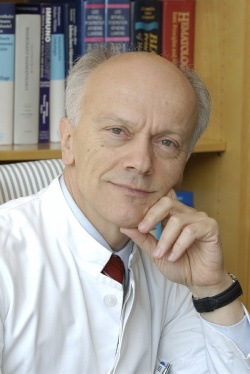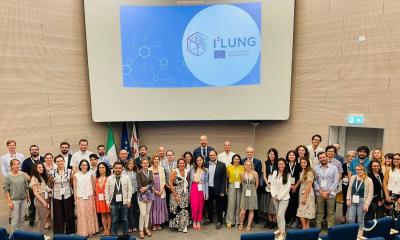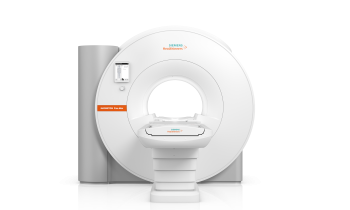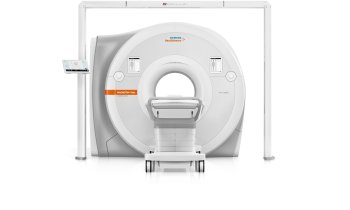National interests hamper EU cross-border research
Germany hopes for better research conditions as revision of the EU Clinical Trials Directive is nigh

The European Union invests over €20 billion a year in clinical research, in the context of Agenda Europe 2020, making an important contribution to growth politics. However, European research projects require not only sufficient funding but also a standardised framework. the EU Commission’s announcement, in July 2012, about the revision of the 2001 European Clinical Trials Directive has raised hopes that the massive downward trend in the number of research applications of the last decade in Germany can be reversed. If Europe does not want to be left behind in research by international comparison, says Professor Gerhard Ehninger, Director of the Medical Clinic I and the Centre for Internal Medicine at the University Hospital Carl Gustav Carus, at the Technical University of Dresden and Executive Chairman of the German Society of Haematology and Oncology, massive efforts are needed.
‘Although the 2001 Directive provides a European framework, it is interpreted very differently by the individual EU Member States and converted into national law,’ he explains. Pan-European studies with participants from several EU countries are therefore hardly possible any more and the trend is definitely moving towards national studies. ‘In Germany in particular, the general parameters for clinical research are very difficult. Across Europe we have the highest expense with regards to costs and staff, but only every tenth research project and every twentieth clinical study are being approved and financially supported,’ he points out.
As an assessor on the Selection Commission, the professor indeed holds solid insights in this field. He sees one of the causes in the fact that the German legislator puts clinical studies with licensed drugs that have already been marketed for 20-30 years on a level with studies concerning the licensing of new drugs. This results in the same administrative expense for the Licensing and Ethics Commission and the same insurance requirements as that of the licensing procedure for new drugs, making the studies very expensive, requiring a lot of staff and making the implementation very difficult in the light of limited budgets.
‘A comparison with other countries shows that working under meaningful, simplified conditions is possible, and therefore for many years we have asked AKW for studies involving already licensed drugs to be subject to other guidelines than those involving substances which have not yet been used to treat any patients,’ he explains.
Overall, the DGHO Executive Chairman expresses four requirements that should make research in Germany easier. 1. In studies involving licensed drugs, the guidelines on the reporting of known side effects should not be subject to the same timing as that for new drugs; only collected reports on observed side effects should be required, with the exception of unexpected incidents. 2. For these kinds of studies, compulsory insurance should not be needed.
‘Germany is the only European country that actually requires compulsory insurance for studies with licensed drugs. Why can’t Germany have public accident insurance, which applies when there are problems involving blood or bone marrow donors, instead of insuring every study participant individually?’ he asks, seeing an example for the implementation of the interests of lobbyists at the cost of the general public. In the other EU countries individual patients are only insured if the drug has not yet been licensed for use on humans. There is another special guideline in Germany that affects insurance: ‘When we carry out an ultrasound examination, for instance to ascertain whether or not a patient is responding to a certain medication, this is being treated as if it was a full clinical study, with all the known impositions, because the ultrasound scan allegedly represents an additional risk. Small wonder then that other countries are laughing about our definition of “study”. Therefore, [point 3.] we are demanding, in the case of non-risk additional exams or interventions, there should be no need to classify these as clinical studies that need licensing and insuring.’
The fourth demand relates to the Federal Office for Radiation Protection and its ineffably long authorisation requirements. With authorisation processes lasting up to a year, there is a good chance that a European study may already be finished by the time the German study partner has had the go-ahead for the implementation of procedures involving ionising radiation. In case of urgent or international studies Germany therefore brings up the rear.
Although Prof. Ehninger now has some hope that the revision will lead to an improvement of the situation in coming years, he remains sceptical: ‘The national interests are still quite substantial; Germans are in fact the ones putting the biggest stops on the implementation of European guidelines.’ On a national level, he sees the necessity of an increase in funding, especially in the case of the German Research Foundation (DFG).
The need to invest more money in clinical research is something of which the German Research Foundation (DFG) is also aware. With the Federal Ministry for Education and Research, the DFG has been running a development programme for large, multicentre clinical studies. With €30 million a year, the programme has the largest funding pot for open topic, non-industry funded studies.
Dr Frank Wising, Programme Director for Clinical Studies at the German Research Foundation: ‘In the last few years, we definitely stepped up our efforts, with the amount of funding (initially €10 million) as well as with the infrastructure, because there are now clearly more clinicians and networks experienced in carrying out these studies. However, our funding is only a fraction of what is invested into clinical studies in the USA and the United Kingdom.’
Last year the DFG could only support 10% of the 170 proposals submitted. ‘The need for these studies is enormous, but they are very expensive,’ Dr Wissing says. Although it has recently been possible to support so-called pilot studies for medical products through the Federal Joint Committee (GBA), all in all clinical research in Germany should be markedly extended, because needs will increase.
The EU has now also recognised the important role of clinical studies. ‘Clinical research in the case of research projects subsidised by the EU is now far more comprehensive and more important than seven or eight years ago, although this funding is programme-controlled and the EU decides where the money goes. Moreover, reimbursement and contractual issues are clearly more elaborate than those for national studies, requiring experienced administrators for their implementation,’ Dr Wissing explains. However, he also shares Prof. Ehninger’s hope that a revision of the European Clinical Trials Directive will further support the expansion of clinical research.
To date, transnational research projects that are supported, for example, by the American National Institute of Health in the US and Europe, with several European countries involved, often end up not going ahead due to the enormous regulatory complexity. ‘But, especially in the case of rare diseases, we cannot do without cross-border studies. Therefore, we are hopeful that the new directive will help to increasingly standardise requirements for clinical studies in Europe, and that there may be just one coordinated and central licensing procedure.’
Profile:
Gaining his medical degree, Gerhardt Ehninger initially worked as a scientific assistant in the Department of Haematology, Oncology, Rheumatology and Immunology, University Hospital Tübingen. Then, as a qualifying internist, in 1985 he became a consultant at Department II in the Medical University Tübingen. In the same year he habilitated and received his Internal Medicine teaching licence. In 1994 he was appointed Professor for Internal Medicine I at the University of Dresden and focusing on haematology/oncology, gastroenterology, infectology and bone marrow transplantation.
Biologist Frank Wissing gained his doctorate at the University of Oxford, UK, and then carried out research in Cambridge. From 2001-2002 he was Junior Working Group Leader at the Department of Parasitology, at Heidelberg University. Additionally, since 2001 he has been Programme Director of the Group Life Sciences 1 at the DFG.
12.11.2012











